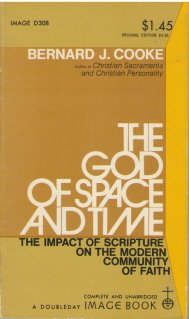First in a series
Many memories have come back to me during the pandemic. Some of these memories have been wonderful, some not so wonderful. One concerned my first day at Marquette University in Milwaukee in 1965. I had received a master’s degree in philosophy from Catholic University in Washington, and my bishop at that time, Bryan McEnteggart, sent me to Marquette to obtain a doctorate in philosophy in order to teach at Cathedral College Seminary, which the bishop was planning to open in 1967.
When I arrived at Marquette I learned that it was possible to take two three-credit courses toward the philosophy doctorate in some subject other than philosophy. I decided immediately to take six credits in theology or, to be more precise, to take six credits in Bernard Cooke, who was the chairperson in theology and who I had heard give some truly wonderful lectures in New York when I was a parish priest.
The chairperson of Marquette’s philosophy department tried to persuade me not to take six credits in theology because he thought that would make getting a doctorate in philosophy more difficult. At that time I was rather docile and tended to be more obedient than aggressive. This time, I insisted on taking the two three-credit courses with Cooke.
Those courses were two of the best I have ever taken, and Cooke was one of the greatest teachers I ever had. I am not exaggerating when I say he had a profound influence on my life. Looking back on that first day at Marquette, I have to interpret my experience as part of God’s providential presence in my life.
These memories came back to me during the 2020 pandemic summer while I devoted time to a wonderful product of Bernard Cooke’s wisdom. As I was reading “The God of Space and Time” (New York: Holt, Rinehart and Winston, 1969, pp. 208, $4.95), I could almost hear Cooke lecturing. In Chapter Four, which is titled “The Gospel of Life,” Cooke writes the following:
“It would be difficult to find a passage in English literature that is more remembered and quoted than the famous soliloquy, ‘To be or not to be,’ from Shakespeare’s Hamlet. Probably the widespread appeal of this passage is that the poet, with his gift for capturing what is universal in human experience, has expressed what is mankind’s most basic quest: the search for real life.
Men have searched for many things: for wealth, comfort, power, fame, for that elusive reality called ‘happiness.’ But basic to all of these is the search for the key to continuing life, since all these other goals have meaning only if one is. Not that sheer continuance in existence is sufficient; men wish to live in the full meaning of that term.” (p. 105)
Several times while I was reading Cooke’s book, I felt that I was not only once again learning theology from this great teacher, but that I was being inspired by him.
I would strongly recommend teachers of theology on the college level to take a look at “The God of Space and Time.”
I fear that some people, thinking of philosophy and theology as academic subjects, fail to realize how relevant those subjects should be in the life of the person studying them. Philosophy looks at reality from the most profound depth that the human mind can reach without directly appealing to Divine Revelation. Theology tries to shed light on reality by exploring the message that God has sent to the human race. I believe that, at their best, philosophy and theology can be “life-changers.”
Neither deals with some unreal world that has little to do with the daily activities of human beings. Once we begin to explore reality deeply, once we start to seriously reflect on what it means to be a human person, what, if anything, is the goal of human life, what is the meaning of freedom and love, what is the meaning of God, anything can happen. We might find ourselves experiencing our human existence in a radically new way.
I don’t know how successful I am, but at the beginning of every course I teach, I try to convince the students that what we are going to be doing in studying philosophy is extremely important. I attempt to persuade the students that if they take philosophy seriously, their lives might change dramatically.
If I was teaching theology I would say that we are embarking on an attempt to understand, as best we can, the mystery of God and the mystery of ourselves. The great help we have in our efforts is the message that God has spoken to us.
Father Lauder is a philosophy professor at St. John’s University, Jamaica. He presents two 15-minute talks from his lecture series on the Catholic Novel, 10:30 a.m. Monday through Friday on NET-TV.
